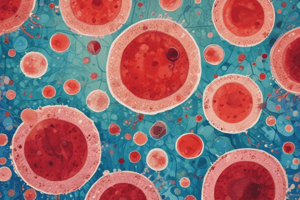Podcast
Questions and Answers
What type of cells are responsible for producing antibodies in humoral immunity?
What type of cells are responsible for producing antibodies in humoral immunity?
Which of the following statements about innate immunity is true?
Which of the following statements about innate immunity is true?
Which immune response primarily targets intracellular microbes?
Which immune response primarily targets intracellular microbes?
What is the primary function of antibodies in the immune response?
What is the primary function of antibodies in the immune response?
Signup and view all the answers
What role do phagocytes play in both innate and adaptive immunity?
What role do phagocytes play in both innate and adaptive immunity?
Signup and view all the answers
Which cells enhance the antimicrobial mechanisms of innate immunity during an adaptive immune response?
Which cells enhance the antimicrobial mechanisms of innate immunity during an adaptive immune response?
Signup and view all the answers
How do innate lymphoid cells contribute to the immune response?
How do innate lymphoid cells contribute to the immune response?
Signup and view all the answers
What is an antigen?
What is an antigen?
Signup and view all the answers
What is the primary function of the immune system?
What is the primary function of the immune system?
Signup and view all the answers
Which statement correctly describes innate immunity?
Which statement correctly describes innate immunity?
Signup and view all the answers
What is adaptive immunity also known as?
What is adaptive immunity also known as?
Signup and view all the answers
Which component of the immune system is primarily responsible for long-term defense against specific pathogens?
Which component of the immune system is primarily responsible for long-term defense against specific pathogens?
Signup and view all the answers
What is the first line of defense in innate immunity?
What is the first line of defense in innate immunity?
Signup and view all the answers
How does adaptive immunity differ from innate immunity?
How does adaptive immunity differ from innate immunity?
Signup and view all the answers
Which of the following best describes the role of phagocytes in the immune response?
Which of the following best describes the role of phagocytes in the immune response?
Signup and view all the answers
What characterizes the kinetics of innate and adaptive immune responses?
What characterizes the kinetics of innate and adaptive immune responses?
Signup and view all the answers
What is the process called when lymphocytes undergo proliferation after activation by antigens?
What is the process called when lymphocytes undergo proliferation after activation by antigens?
Signup and view all the answers
How long does it typically take for a secondary immune response to develop after antigen exposure?
How long does it typically take for a secondary immune response to develop after antigen exposure?
Signup and view all the answers
What describes the immune system's ability to not react against the body's own antigenic substances?
What describes the immune system's ability to not react against the body's own antigenic substances?
Signup and view all the answers
What effect does the clearance of infection have on the immune response?
What effect does the clearance of infection have on the immune response?
Signup and view all the answers
What determines the variability in the kinetics of antibody production after immunization?
What determines the variability in the kinetics of antibody production after immunization?
Signup and view all the answers
What is one of the primary functions of antibodies in the immune system?
What is one of the primary functions of antibodies in the immune system?
Signup and view all the answers
Which type of immunity is achieved through vaccination or infection?
Which type of immunity is achieved through vaccination or infection?
Signup and view all the answers
What type of antigens do most T cells recognize?
What type of antigens do most T cells recognize?
Signup and view all the answers
How do antibodies fail to protect the body from certain types of microbes?
How do antibodies fail to protect the body from certain types of microbes?
Signup and view all the answers
Which of the following describes passive immunity?
Which of the following describes passive immunity?
Signup and view all the answers
What is a common way newborns acquire passive immunity?
What is a common way newborns acquire passive immunity?
Signup and view all the answers
Cell-mediated immunity primarily involves which type of immune cell?
Cell-mediated immunity primarily involves which type of immune cell?
Signup and view all the answers
Which statement correctly contrasts the specificities of B and T lymphocytes?
Which statement correctly contrasts the specificities of B and T lymphocytes?
Signup and view all the answers
What does specificity in the adaptive immune system refer to?
What does specificity in the adaptive immune system refer to?
Signup and view all the answers
What characterizes clonal selection in the adaptive immune response?
What characterizes clonal selection in the adaptive immune response?
Signup and view all the answers
What is meant by immunologic memory in the adaptive immune system?
What is meant by immunologic memory in the adaptive immune system?
Signup and view all the answers
During the primary immune response, what type of lymphocytes initially responds to an antigen?
During the primary immune response, what type of lymphocytes initially responds to an antigen?
Signup and view all the answers
What distinguishes a secondary immune response from a primary one?
What distinguishes a secondary immune response from a primary one?
Signup and view all the answers
What role do memory lymphocytes play in the adaptive immune system?
What role do memory lymphocytes play in the adaptive immune system?
Signup and view all the answers
How does the adaptive immune system respond to persistent infections?
How does the adaptive immune system respond to persistent infections?
Signup and view all the answers
Which of the following statements regarding the response to antigens X and Y is accurate?
Which of the following statements regarding the response to antigens X and Y is accurate?
Signup and view all the answers
Study Notes
Immunity Overview
- Immunity is resistance to infectious diseases; the immune system consists of cells, tissues, and molecules mediating this resistance.
- Immunology studies the immune system's responses to pathogens and its role in diseases.
Types of Immunity
- Host defenses are divided into innate immunity and adaptive immunity.
- Innate Immunity: Provides immediate, non-specific protection against infections; always present and includes physical barriers like skin and mucosal tissues.
- Adaptive Immunity: Develops more slowly and provides a specialized response; involves lymphocyte activation and differentiation after exposure to pathogens.
Mechanisms of Innate and Adaptive Immunity
- Innate immunity includes barriers (skin, mucosal tissue) and cellular components (phagocytes, natural killer cells, complement system) that recognize and eliminate microbes.
- Adaptive immunity involves the action of lymphocytes; B cells produce antibodies for extracellular pathogen elimination, while T cells handle intracellular pathogens.
Humoral vs. Cell-Mediated Immunity
- Humoral Immunity: Mediated by antibodies secreted by B lymphocytes, targeting extracellular microbes and toxins in body fluids.
- Cell-Mediated Immunity: T lymphocytes manage defense against intracellular microbes, killing infected cells or activating phagocytes to destroy pathogens.
Active and Passive Immunity
- Active Immunity: Induced by infection or vaccination; the body mounts a response to develop long-term resistance.
- Passive Immunity: Transferred from another immune individual (e.g., maternal antibodies to newborns) providing immediate but short-term protection.
Properties of Adaptive Immune Responses
- Specificity: Ability to distinguish between millions of antigens.
- Diversity: The extensive repertoire of lymphocyte receptors to recognize numerous antigens.
- Clonal Selection: Mature lymphocytes with specific receptor populations proliferate and differentiate when their antigen is encountered.
Immunologic Memory
- Repeated exposure to an antigen results in faster and more robust responses (secondary immune response) due to memory lymphocytes generated during the primary response.
- Immunologic memory enhances the ability to combat persistent infections; vaccines create long-lasting immunity.
Immune Response Dynamics
- Clonal expansion occurs upon lymphocyte activation, rapidly increasing the number of antigen-specific cells to tackle infections.
- Immune responses are self-limited, allowing the immune system to restore a resting state after pathogen elimination.
- The immune system maintains tolerance to self-antigens, avoiding reactions against the host's own tissues.
Timeline of Immune Responses
- Primary immune response: Typically requires 1 to 3 weeks to develop.
- Secondary immune response: Much faster, taking about 2 to 7 days for recognizable immune activation.
Summary of Immune Activities
- Antibodies neutralize microbes at mucosal surfaces and in the blood, preventing infections.
- T cells recognize and respond to infected host cells, directing the immune response against intracellular threats.
Studying That Suits You
Use AI to generate personalized quizzes and flashcards to suit your learning preferences.
Related Documents
Description
Explore the mechanisms of innate and adaptive immunity in this quiz on immunochemistry. Understand how the immune system combats infectious diseases through the coordination of various cells and molecules. Dive deeper into the responses generated against microbial pathogens.




